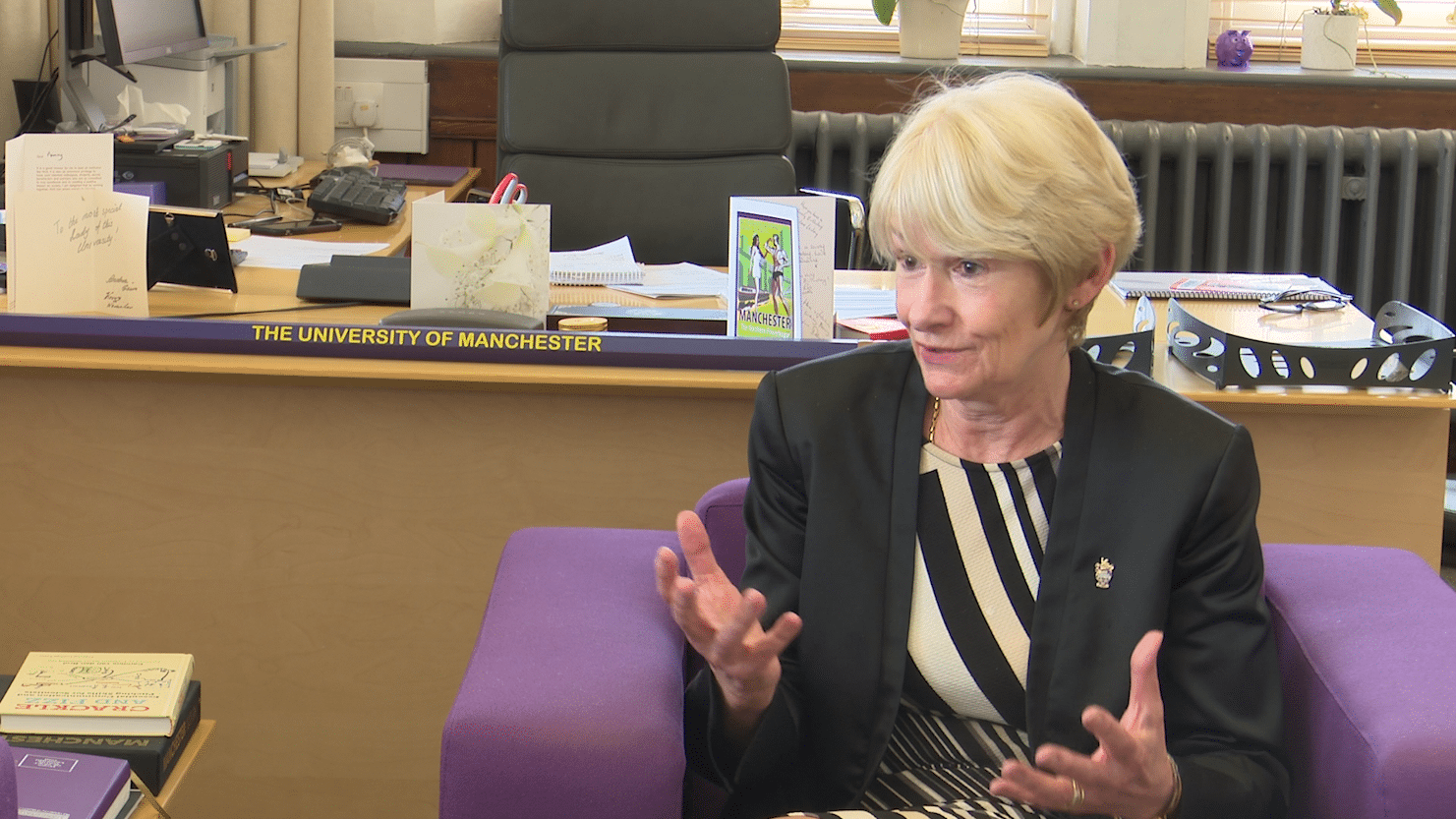It’s been a turbulent time for the university sector, and not least the University of Manchester.
We’ve had staff strikes over pay and pensions, rows over Vice Chancellor pay and expenses, and the looming and ominous uncertainty of Brexit hanging over it all.
Which is why it was such an opportune time to talk to our President and Vice Chancellor, Nancy Rothwell.
To some, she appears somewhat elusive, a figure only referenced in the height of controversy or merit. However, in recent months, she’s been in the limelight more than ever, something that is probably starting to get somewhat tiresome.
But I relished the opportunity to discuss the pressing issues of the day with her — and I definitely wasn’t short of questions.
We settled down in her office overlooking the Quad, sunlight streaming in, and I got straight to the point: pension strikes. It would be hard, I said, to do the interview and not talk about the unprecedented industrial action that stemmed from a decision by Universities UK to change lecturers’ (and other university staff) pensions from defined benefit, to defined contribution. This essentially would have meant, where in the past they’ve had a concrete sum of money that they would received when they retire, their money would be invested at the discretion of the pension provider, and they could end up with less than they put in.
I asked her how she personally felt about it and how she believed we should reduce the pension deficit. She told me that the situation was “very worrying”, and that she was very concerned at the prospect of staff losing “something very important to them”.
She continued to tell me that she didn’t know how the issue could be resolved in the long run as the deficit is huge, and economic gap like that “can’t come without consequences”. She admitted, though, that bigger institutions like Manchester are better equipped to deal with the shortfalls.
She confirmed too that the new deal that the University and Colleges Union have agreed to, includes the stipulation that the original proposal is “off the table”, although that does not mean a complete turnaround from the use of defined contributions when it comes to lecturers pensions: “I don’t think anybody can say for certain that there won’t be some move because there already has been — it might just be not affordable”.
But, as we all know, it’s not just the lecturers who were affected. Students were dragged into the row through the loss of countless contact hours and dissertation supervision over February and March.
I asked Dame Rothwell, in light of the recent calls for compensation (mainly in the form of remuneration), what is she, along with the rest of University, doing to help the affected students?
She firstly explained that she’s asked staff “where they feel able to and willing, to replace lost teaching”, but that this isn’t something the University is enforcing as a rule as they believe it would be “unfair”.
She alluded to a possibility of “whether or not there needs to be an adjustment to the way exams are marked”, but in an open meeting for the School of Social Sciences with herself and other senior staff members at the University, Professor Clive Agnew (Vice-President for Teaching, Learning) dismissed the idea, saying he didn’t want to devalue the degrees achieved this year, so there is still some uncertainty surrounding this.
When it came to the question of compensation however, she seemed unconvinced that this would be a viable option in the short term, as, in her words, “students across the University have been affected in very, very different ways”.
I then posited the argument (first brought up in the annual SALC open meeting by Jacqueline Skiptunis, and reiterated in a tweet to The Mancunion from an MA human rights student called Josh) that courses aren’t costed in this kind of nuanced manner – students are asked to pay a blanket fee, regardless of how many contact hours they will receive. So why should their compensation for lost teaching time be any different?
Her answer centred on the idea that compensation would depend on “a set of principles” — does one ‘unfairly’ give one student who only lost three hours of teaching the same amount of money as one who’s lost 30? Principles needed to be decided upon she said, not detail.
However, this seemed to slightly miss the point — and evade the question. Especially given that some detail is already being discussed, one option being covering graduation costs. She wasn’t sure about whether or not they’d go for it though, and apparently nothing’s been agreed as of yet.
I also mentioned that legal firms have started approaching students and telling them that they have a case to sue the university over lost teaching time. Many students were outraged at Clive Agnew’s statement in the Social Sciences open meeting that all the University of Manchester was contracted and required to deliver was a degree, as some took that to mean that their education wasn’t something they were entitled to in his eyes.
This has led some to lean towards the idea of legal action, and the MEN have reported recently that over 90 students have joined some a group legal action, but Nancy Rothwell issued a stark warning to those who would pursue it: “I would really really hope we don’t get to the position of legal disputes because lots of people lose out in legal disputes even the ones who win the case possibly”.
We then moved on to the ongoing Campus Masterplan – in essence the move from North Campus to Oxford Road (mostly, anyway). Dame Rothwell told me it’s set to be finished in 2021, and that’ll include projects such as the new Business School which is close to being finished.
However, there isn’t going to be a complete shift from North Campus. Whilst none of the remaining buildings near Sackville Street and Upper Brook Street will be “student-facing”, there will be some incredible new research facilities such as the Graphene Engineering and Innovation Centre.
What this does mean though is that “there will be a very large piece of free hold land that the University owns” and, at the moment, there hasn’t been a concrete decision as to what shape that will take, and what it will be used for.
One idea is to turn it into an “innovation district”, somewhere that would encourage new and hip start ups to set up shop and provide employment opportunities for graduates.
Some have previously said that the move was pointless, but Rothwell was adamant that students should all be engaging with things like the Students’ Union and using the Learning Commons, and the best way of doing that was making them more local to those students.
Some projects have been halted though such as Coupland 3, which was a “big redevelopment in arts”. Apparently since Brexit, funding has been uncertain, so prioritisations had to be made, and they seemingly favoured more science-focused projects.
I asked her then about Brexit’s wider impact on universities, and she tole me that “it’s hard to say for sure what will be the biggest impacts of Brexit because there’s still so many unknowns” but that obviously, as mentioned before finance and access to grants is definitely an issue.
She said though that she’s in continuous conversations with ministers and civil servants, expressing her concerns, and that she wants to ensure European students that the University of Manchester is welcoming of them and “open for business” — channelling our Prime Minister a little bit there!
Funding is of course an issue, but it’s not the only hot topic in finances that has been gracing our headlines in recent months. After Bath’s former Vice Chencellor’s enormous pay packet was exposed, conversations were starting to be had about whether or not Vice Chancellor pay was fair and just.
Then, to top it all off, Channel Four launched a huge investigation into Vice Chancellor expenses, and some cases seemed even more ridiculous than the MP expenses scandal of years gone by — one Vice Chancellor in particular expensed a flight from Australia to the UK… for his pet dog. Ludicrous.
I then asked her if there should be regulation on pay and expenses. She told me: “regulation is difficult because universities are autonomous, independent organisations” but that there are new guideline that are due to be published imminently.
She was clear that the most important thing that should (and hopefully will) come from it is “absolute transparency… making sure vice chancellors have no role in their own salary… and that expenses are appropriate”.
The University of Manchester however has set up a separate committee that discusses Rothwell’s pay that she doesn’t sit on.
Now, Nancy’s salary might be high, but she seems to be somewhat of an anomaly when it comes to women in high paid jobs at the University of Manchester. Women at the university of Manchester are paid thirteen percent less than men on average, which is higher than the national average of just under ten per cent. Women make up 39.4% of high paid jobs and 60% of lower paid jobs. So I asked her: what are you and the rest of the university doing to close this gap?
According to her, “we have been doing numerous things for a long time and it is getting smalled but there’s still a gap to close”. That includes mentoring women who seem as though they’re ready for a promotion as, in her words: “we found from doing an internal study is that men were, on average (and you have to be careful about generalisations), more likely to come forward for a promotion, and women tended not to put themselves forward”.
So why does she think women don’t want to come forward for a promotion? Well, she said based on research done internally at the university, “women are less confident in promoting themselves”.
She said that “I was asked if I would apply to be Vice Chancellor, and I said no, and the reason I said no was because I thought it was a job that I couldn’t do.
“And then I read I book, which is a very good book which is called Beyond the Boys Club, and it was from a senior female coach, and it said that men have a tendency — not all men — to look at a job and think ‘I can do some of that, so I’ll go for it’. Women have a tendency to have a look at the job and think ‘I can’t do some of that so I won’t go for it’”.
Her belief, then, is that more women need to be encouraged to think of themselves in a more positive light professionally.
And she said she certainly hopes it’s encouraging that we have a female Vice Chancellor, at the very least.
I finished by asking her about her biggest challenges and highlights in her role, given it’s coming up to her eight year anniversary as President and Vice Chancellor. She mentioned the Manchester bombing and deaths of students that she solemnly described as being “pretty bad”. She also said the day after the EU referendum was “not a good day” for her.
Highlights included the Nobel prize ceremony in Stockholm in 2010 when Manchester scientists Professor Andre Geim and Professor Konstantin Novoselov won the prize for their discovery of graphene, and all graduations.
Although, this year’s graduation may not be as sweet if the students’ robes are coming out of the university’s pockets…






